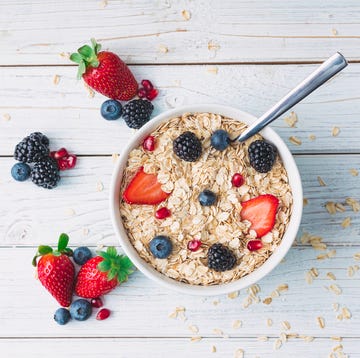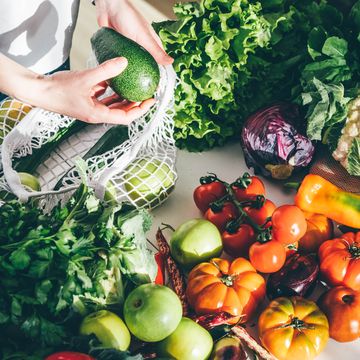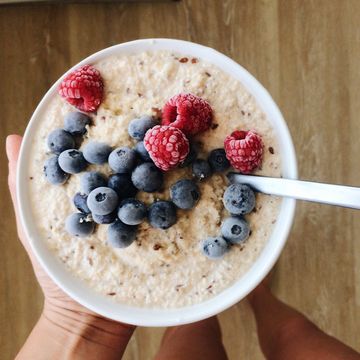Eating more fiber is a smart choice for reasons beyond your digestive health. In fact, you might be surprised to learn that a new study published in Nature Communications suggests that consuming prebiotic fiber supplements can improve cognition by increasing good bacteria in your gut.
“We knew via the growing body of existing research into the gut-brain axis that the potential was there to influence cognition via the gut microbiome,” says study author Mary Ni Lochlainn, M.B.B.Ch., Ph.D., a clinical lecturer at Kings College London. “However, we were surprised that our simple prebiotic was able to achieve a difference in a short 12-week intervention.”
What did the researchers find?
First, a quick reminder: Prebiotics are food for probiotics, the famous good gut bacteria that aid digestion and reduce inflammation.
This study included 36 pairs of twins ages 60 and older. (Studying twins helps researchers reduce the effects of differences in ages, genes and early life environments between study groups.) Half took a daily supplement of protein powder mixed with a prebiotic supplement made of inulin (found in garlic, artichokes and chicory root) and fructo-oligosaccharides (found in leeks, onions and asparagus). Their twins ate the same protein powder mixed with a placebo.
At the end of the 12-week study, the siblings who consumed prebiotic fiber improved their scores on a series of cognitive tests, on average, compared to their twin. They made fewer errors on a test of visual memory and learning ability that can reveal early signs of Alzheimer’s Disease and dementia. They also had increased gut levels of Actinobacteria, especially beneficial Bifidobacteria.
How might prebiotic fiber affect thinking and memory?
It may seem far-fetched that this bacterial shift could change your brain, but researchers point to the gut-brain axis connecting the two organs. “We know our prebiotic led to an increase in bifidobacterium, which is thought of as a 'healthy' bacteria,” says Lochlainn. “We don't know the mechanism of how exactly this led to an improvement in cognition, but the gut-brain axis is connected in many ways, for example, direct nerve tracts such as the vagus nerve, hormonal signals other metabolites such as short chain fatty acids which communicate with the brain, and via immune pathways too.”
Could other prebiotics besides inulin and fructo-oligosaccharides — such as psyllium, the ingredient in many fiber supplements — shift gut bacteria to boost brain health? It’s plausible, says Lochlainn, but more research is needed since each fiber is unique.
Either way, prebiotic fibers have plenty of perks, says Nina Olsen, R.D.N., L.D./C.D., the founder of Metabolic RDs. Prebiotics can boost digestive health by easing bloating and promoting regularity. They can keep you full and support blood sugar regulation and insulin sensitivity. They can also boost the uptake of calcium, magnesium and iron, which are critical for bone density, she says. They may even strengthen the gut barrier to reduce inflammation
How can I eat more prebiotic fiber?
Most Americans don’t eat enough fiber, including prebiotics. Olsen suggests aiming for 25 to 35 grams of total fiber per day, including 10 to 20 grams of prebiotic fiber. If you're not there yet, add only 3 to 5 grams of prebiotic fiber per day and work your way up, says Olsen. If you consume too much too fast, you might experience bloating, constipation, or cramps.
“I explain this to my patients like a fish tank, where the probiotics are the fish and the prebiotics are the fish food,” says Olsen. “If you put too much fish food in, you're going to have a dirty fish tank and maybe a bunch of unhealthy fish. If you don't feed the fish as well, those fish are going to die.”
Try food sources of prebiotic fiber like bananas, garlic, onions, leeks, asparagus and artichokes. “Think variety over volume,” says Olsen. “Rotating fiber sources builds a stronger, more resilient microbiome.”
The bottom line
When you're not getting enough fiber from your diet, a supplement can fill the gaps — and may even boost your brainpower. Supplements with psyllium, inulin, fructo-oligosaccharides or acacia fiber can be good choices. If you have a sensitive gut or a history of irritable bowel syndrome, Olsen recommends a partially hydrolyzed guar gum supplement. It’s a gentle prebiotic derived from guar beans. Pick a product tested and verified by a third party, like NSF, USP or Informed Choice.
Laura Iu, R.D., is a registered dietitian nutritionist, certified intuitive eating counselor, yoga guide, and owner of Laura Iu Nutrition, a private practice in New York City. She earned her Bachelor of Science in Nutrition and Dietetics from New York University and completed her internship in dietetics at Weill Cornell & Columbia Medical Center of New York-Presbyterian Hospital. She went on to work in New York City’s top hospitals, including Mount Sinai Hospital and NYU Langone Health. She believes that true health is all encompassing — physical, emotional, and mental wellbeing — not an external measure via shape or size.

















